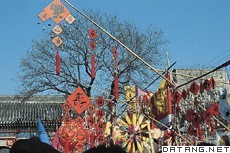1) festival custom


节日民俗
1.
The richness of the festival customs in the T'ang dynasty had been paid much attention by the scholars afterwards.
本文是专门研究唐代节日民俗与文学的学术论文,全文共分五章及一个附录。
2.
Traditional festival custom, as a kind of folk tradition established by usage, has a deep historical origin and unique life force.
节日民俗作为人民群众生活中一种约定俗成的民间传统,有着很深的历史渊源和独特的生命力。
2) Folk Festivals


民俗节日
1.
Traditional Splendid Cultures and Proprieties of Folk Festivals;


浅论传统优秀文化与民俗节日礼仪
3) Traditional holiday folk custom park


传统节日民俗园
4) festivals and folk customs


节日民俗文化
1.
The rich and unique culture of festivals and folk customs of the minority in Yunnan,which can enrich people s lives,expresses the spirit of the Confucianists with the essence of the minority itself.
云南少数民族节日民俗文化丰富而独特,它沉积和浓缩了该民族的精华,体现了儒家文化精神,调节着人们的社会生活。
5) Folk festival in spring


春季节日民俗
6) Folk Customs at Traditional Chinese Festivities


中国传统节日民俗
补充资料:民俗
| 民俗 folklore 一个民族长期形成的风尚和习俗等的总称。包括民间风俗、习惯、信仰和各种口传文学,诸如神话 、故事 、符箓、谜语、谚语、祷词、歌谣、歌曲、迷信以及节日典礼、传统游戏、艺术、手工艺等。民俗作为术语最初由英国考古学家汤姆斯在1846年使用。民俗具有以下特性:①传承性。某一类型的民俗在形态与性质方面自始至终有着大致相同的形式或大致相同的内容。②变异性。某一民俗类型的内容和形式在流传过程中由于受到地理环境、时代或民族传统文化等诸多因素影响,会产生一定的变异。③历史性。民俗会随着人事的更替以及社会经济 、政治的演变而形成 、发展与消失,从而往往成为特定历史阶段的标志。大部分民俗是一些仍有实用价值的历史残存。作为学科名词,亦可译为民俗学,但后来逐渐转向专门研究民间文学的活动。
|
说明:补充资料仅用于学习参考,请勿用于其它任何用途。
参考词条
